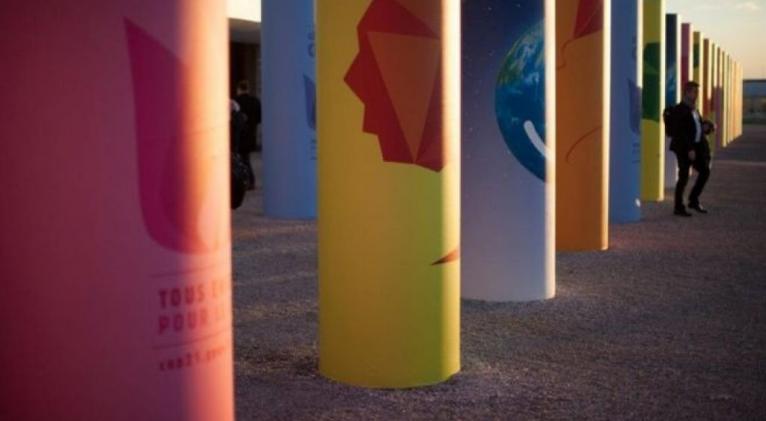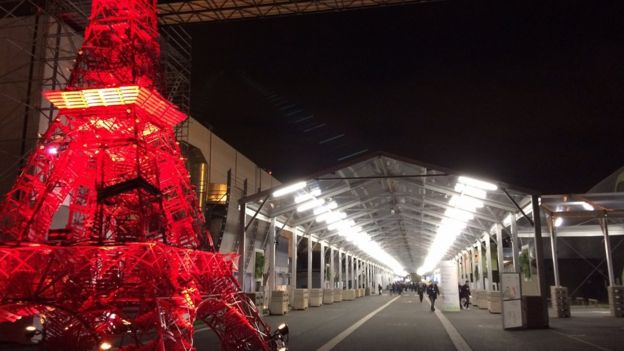COP21: 'Fireworks' expected as new climate text published
especiales

This new version, 29 pages long, marks the first time the French presidency of the meeting has pulled together an outline of a deal.
The new draft has significantly reduced the options on many of the key questions after days of negotiations.
One observer warned that there could be "fireworks" if countries are unhappy with the compromises proposed.
Last Saturday, negotiators from 195 countries agreed on a weighty 48-page document, the summation of four years of talks that began in Durban in 2011.
That document was handed to the French president of COP21, Laurent Fabius.
Over the past few days he has asked pairs of ministers from around the world to try to advance aspects of the document.
COP21 Live: The latest updates from Paris
Today marks the first time when the French will present their version of the progress that has been made.
They have included a smaller number of options on some of the most contentious issues.
According to Mr Fabius, the key difficulties have been identified.
"The focus is now on open questions that still need to be settled at a political level," he told the negotiators.
On the key issue of what the overall purpose of the document should be, there are now three options:
- The first says that temperature rises should be kept below 2 degrees C above pre-industrial levels
- The third option says they should be kept below 1.5 degrees
- But option two, the one which would seem to be the obvious compromise at present, says temperatures should be kept well below 2 degrees C while scaling up efforts to limit the rise to below 1.5, while recognising that in some parts of the world there are high risks projected even for warming at that level.
Tied in with the question of temperature is the issue of moving away from fossil fuels.
This collective long term goal has many of the key elements in square brackets indicating areas of disagreement.
The options here range from cutting carbon emissions 40-70% below 2010 levels or 70-95%, or to achieve net zero greenhouse gas emissions by the end or after the middle of the century.
The term "decarbonisation" is still in the text, in brackets. Many green campaigners will be pleased with that although countries like Saudi Arabia will find that term hard to take.
'Risky business'
Observers were unsure as to how the parties would react to the new text.
"This is the first time the French fingerprints will be on the process, and that's a risky business," said Dr Diarmuid Torney from Dublin City University, who is an observer at these talks.
"We saw [this] earlier this year at a previous climate meeting in Bonn when the co-chairs tried to come up with a shorter text and the response from parties was to re-insert all their favourite parts back into the text. There could be fireworks."
Mr Fabius said that the remaining difficulties centred on differentiation, finance and the level of ambition.
Richer countries want a greater number of developing nations to take on responsibilities to cut emissions and to contribute to climate finance initiatives. They argue that the world has changed since 1992 when the UN climate convention was signed.
The developing countries don't see it that way.
 Negotiators were facing a long session at COP21 after the publication of the latest text
Negotiators were facing a long session at COP21 after the publication of the latest text
"The world has not really changed in terms of the kind of poverty and in terms of the number of people who are suffering," said Meena Raman from the Third World Network.
"The developed countries are hell bent on changing this principle so we can expect a big fight."
Despite the significant gaps on critical issues, the talks were boosted yesterday by the announcement of an alliance between the European Union and 79 African, Caribbean and Pacific countries.
The partners are backing a legally binding deal that will be reviewed every five years.
This coalition of developed and developing countries is seen as an important step in securing an overall agreement.
"It isn't really about a single coalition working to a single set of aims, it's about countries working out that they have a range of different things they are trying to achieve and they need to work with different partners to achieve that," said Ruth Davis from Greenpeace.
UN climate conference 30 Nov - 11 Dec 2015

COP 21 - the 21st session of the Conference of the Parties - will see more than 190 nations gather in Paris to discuss a possible new global agreement on climate change, aimed at reducing greenhouse gas emissions to avoid the threat of dangerous warming due to human activities.
COP21 Live: All the latest from Paris
Explained: What is climate change?
In video: Why does the Paris conference matter?
Analysis: Latest from BBC environment correspondent Matt McGrath
In graphics: Climate change in six charts
More: BBC News climate change special report













Add new comment